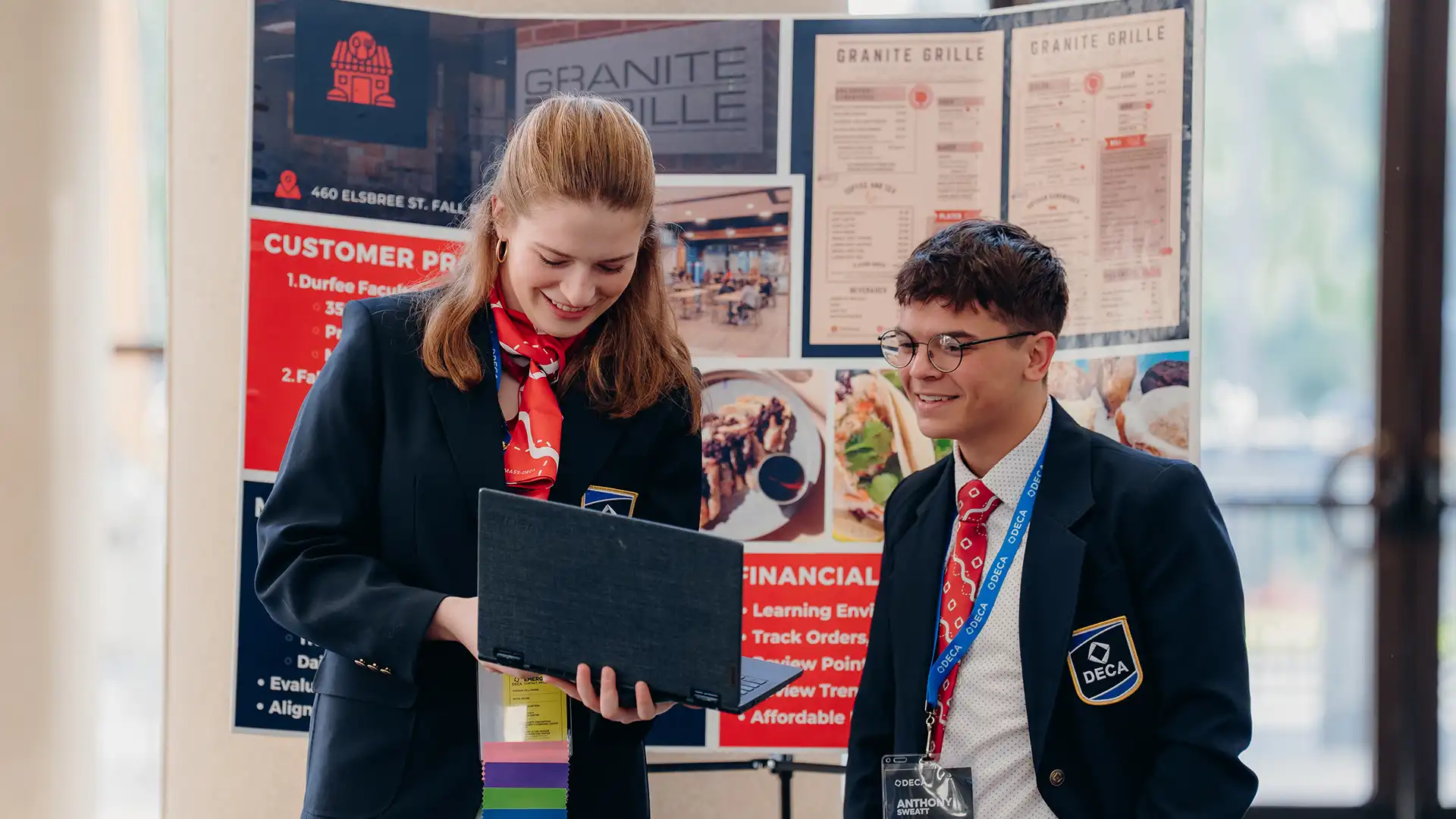All around the world, DECA students are working hard to prepare for the 2023 International Career Development Conference this April. Students participating in the competitive events program will appear before a volunteer judge to present on current business trends in various events and formats. In addition to DECA’s competitive event resources, we thought it would be helpful to hear from two of our dedicated volunteer judges, Wendy Lindquist Williams and Kim Carman, as we prepare to get the edge in Orlando.
Wendy Lindquist Williams brings a background in human resources, market research and life to the judge’s table. She has been judging for 20 years. More importantly, Wendy considers herself a mentor, judge, chaperone and friend of DECA.
Kim Carman has served as a volunteer judge for the past 49 years. He has judged every level of MA DECA competition, NH DECA state competition and 28 ICDCs. He recently retired from a Facility Management Supervisor position at Technical High School after a 39-year involvement with the school. Kim is also involved in the Massachusetts scouting program, recently completing 56 years and working on 57.
1. Please tell us about your DECA competitive events judging history.
Wendy: A DECA judge brings their professional and personal experience to the judging table. Honestly, we are nervous too. We truly want the best for the participants. I have been judging at the District, State, International, and Collegiate levels for 20 years. I truly can say I have judged all categories and continue to do so because of the participants. It is amazing to see the creative, intelligent, and yes, well-rounded individuals that have crossed my judges table in all those years.
Kim: I graduated from Wareham High School in 1973; the year after 1974, my business teacher had recently started a DECA chapter and requested that I attend a district competition to serve as a judge in Finance and Credit. Here I am, 49 years later, still judging! I have judged district and state competitions for both Massachusetts and New Hampshire and conducted workshops, and this will be my 29th ICDC.
2. How important is a first impression during competition?
Wendy: From the moment the participant walks up to the table until they gather their “props” and leave, a judge has started doing their job – judging. It is important to walk to the table and stand waiting to get the “go-ahead” professionally.
Kim: First impressions are very, very important, I would go so far as to say your first 30-second encounter with the judge is most likely your most important time with the judge.
3. How do you use DECA’s performance indicators while judging?
Wendy: Remember to hit all the Performance Indicators. Always make it easy for the judge to score you higher by ensuring you mention each Performance Indicator within the context of addressing the category. As a judge, if I struggle to “remember” or note that I covered a topic, you can be assured that the category will not score well.
Kim: Performance indicators serve as a great guide for judging, I put a lot of emphasis on those indicators.
4. If you have judged events with a written component, how can students make their report stand out?
Wendy: An important component of any written paper is information outside of what is obvious. Is there a statistic that might accentuate a point, or is there a recent event that impacts your conclusion? It goes beyond the obvious to grab my attention and keep it.
Kim: The use of graphics greatly enhances a written project. If the subject fits, human interest-type projects are of special interest to me, but if not, make the project interesting, intriguing, and different.
5. What is your top piece of advice for competitors in a role-play presentation?
Wendy: In a Role-play situation, the participant should know their role’s relationship with the judge. This determines how you “talk” to the judge. If the judge is a supervisor within the same company, the problem is ours and there can be a level of urgency to implement your ideas as it will help us! If you are to assume a consultancy role, then you can take a more assertive approach in that the judge hired you to tell me what to do. It is your company, but I am here to help. The judge-participant role sets the stage for the event.
Kim: Stay focused, be yourself, know your material, dress for success and above all else, think of yourself in a professional setting.
6. What advice do you have for first-time competitors?
Wendy: Be confident, show your knowledge (as it applies to the event), have a “wow” factor, but most importantly, have fun and know you have the judge’s admiration for even being here and putting your best foot forward. Ultimately at the end of a long judging day, I want to be assured that I have sent the best candidates of the day to the stage to receive their glass.
Kim: Be yourself, be confident, be professional and focus on why you are there. Also, remember that in some cases, your judge is judging for the first time and may be just as nervous as you are.
7. What is your most memorable judging experience? Why was it memorable?
Wendy: Nothing is more memorable than seeing an event that won third place at one level of competition advance to a first-place winner at the next. What does that tell me? It tells me that they wanted and strived for more. They made improvements, heeded the judge’s advice then exceeded expectations. Do not “assume” that winning at one level is “good enough” at the next level. Always continue to learn, grow and be better than you were before.
Kim: In 2015, I was lucky to be assigned a written project in the preliminary rounds that outlined a community service project. What made the project so interesting was that the subject was, in fact, about the competing student's own life experience with bone cancer, his diagnosis, his treatment and most importantly, his year-long efforts to fundraise for a local cancer treatment center and make greater awareness of the disease. Unfortunately, after being in remission for some time, he succumbed to his disease during his sophomore year of college. I think of this project and student a lot; when I have a bad day, I think of what he endured and how he handled it. His awareness of this illness, fundraising, etc... continues today at his High School.



















